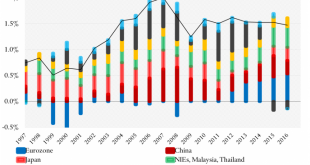In August 2014, I wrote this post arguing that harsh austerity during the Depression caused Hitler's rise to power. At the time, my argument seemed controversial, at least in Germany. There, it is not the austerity of 1930-32 that is blamed, but the debt-driven hyperinflation of a decade earlier. Germans remain terrified of both inflation and debt to this day.I am certainly not the only person to identify a causative link between austerity and Hitler. Here is Paul Krugman slapping down...
Read More »Bill Mitchell — Germany – a most dangerous and ridiculous nation
Germany’s domination of the EMU is clear both in political and economic terms. The current political impasse within Germany will not change that. Once resolved the on-going government will continue in the same vein – running excessive fiscal surpluses and huge external surpluses. It can sustain those positions because it dominates European policy and can force the adjustment to these overall ‘unsustainable’ positions onto both its own citizens (lowering their material living standards),...
Read More »Der Spiegel — REVEALED: 2,500 German neo-nazi mercernaries fought in Ukraine conflict
German news. Will the US and UK new report it? Fort RussREVEALED: 2,500 German neo-nazi mercernaries fought in Ukraine conflictDer Spiegel Translated by J Flores
Read More »Edward Harrison — Germany’s coalition talks are sowing the seeds of the euro’s breakup
For years now within Germany’s policy circles, there have been many who have pushed for an ‘expulsion’ or ‘voluntary exit’ mechanism for the Eurozone. I am now hearing this position advocated by FDP head Christian Lindner, a potential finance minister in the new German governing coalition. I believe this affects Italy the most and sets up an existential crisis down the line for the EU.... The upshot here is two-fold. First, in a crisis situation, a politically independent hardline German...
Read More »IMF Provides Cover for Europe’s Dysfunctional Currency Union
The Council on Foreign Relations’ Brad W. Setser has produced a couple of interesting blogposts on Germany’s fiscal policies of late. The first one, titled “Germany Cannot Quit Fiscal Consolidation,” was published at the end of August. On September 18th, the second one appeared, titled “The Global Cost of the Eurozone’s 2012 Fiscal Coordination Failure.” The latter is more limited in scope and draws heavily on a recent report by the Banque de France. Setser elaborates on the rather...
Read More »Dalia Marin — The China shock: Why Germany thrived while the US struggled
Previous research has shown that China's entry into the WTO in 2001 has had a profound impact on jobs and wages of low-skilled workers in the US in sectors exposed to Chinese imports. The same is not true for Germany. This column argues this is because the import-side trade adjustment to low-cost competition had already happened before the rise of China, because the rise of Eastern Europe offered new export opportunities for German firms, and because China’s love for product quality found a...
Read More »Christian Reiermann — A Shrinking Giant: EU Worries Grow over U.S. Economic Chaos
Under Donald Trump's leadership, the U.S. is in the process of forfeiting its position of economic supremacy. An internal EU document shows that the Europeans are worried. Translation: Germany is worried about its trade surplus.Spiegel OnlineA Shrinking Giant: EU Worries Grow over U.S. Economic Chaos Christian Reiermann
Read More »Charles and Louis-Vincent Gave — Gavekal On The Coming Clash Of Empires: Russia’s Role As A Global Game-Changer
This is an interesting analysis from the POV of globalization, the global economy, geopolitics, geostrategy and political economy. I am not endorsing the analysis itself, although it is plausible and makes many good points such as the geopolitical conflict between sea-power or thalassocracy, and land-power or tellurocracy. While the specifics are interesting, the method of analysis is much more significant. The chief reason I am posting it is to show how developing an entire...
Read More »The “German Problem” Is Not a Problem for Anyone to Worry About. Or Is It?
It took a very long time. Too long. But just in time for the recent G20 meeting in Hamburg on July 7-8, The Economist’s cover page story featured Germany’s persistent current account surpluses as the world community’ new “German problem”; supposedly an issue of foremost interest to the G20. In fact, Germany has run up current account surpluses exceeding 4 percent of GDP in each and every year since 2004. For the last couple of years Germany’s surpluses even exceeded 8 percent of GDP....
Read More »Why Macron Should Not (and Cannot) Follow the German Model
Jörg Bibow | June 2, 2017 The Economist‘s analysis of Germany’s job market miracle of the past ten years offered in “What the German economic model can teach Emmanuel Macron” is more balanced than the usual accounts one hears in Germany itself. Germans are in love with the idea that structural reform of their labor market and persistent budgetary austerity were solely responsible for the German economy’s superior performance...
Read More » Heterodox
Heterodox


